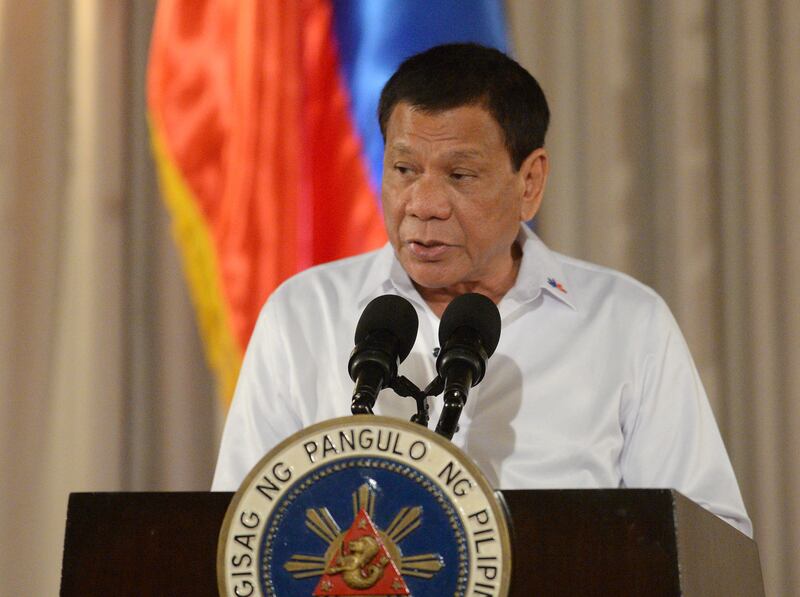President Rodrigo Duterte plans to extend martial law in the southern Philippines to defeat Islamist militants who have seized a major city, his administration said on Tuesday, as critics warned the country could be edging towards a dictatorship.
Mr Duterte had imposed military rule for 60 days in the Mindanao region, home to 20 million people, after gunmen waving black ISIL flags occupied Marawi city on May 23, triggering clashes that have killed more than 550 people.
While the military said at least 60 militants continued to hold out against government forces nearly two months later, critics expressed surprise by Mr Duterte's request for a martial law extension until December 31.
"I have come to the conclusion that the existing rebellion in Mindanao which has prompted me to issue [the martial law proclamation], will not be quelled completely by 22nd July 2017," Mr Duterte said in a letter to Congress.
Congress is to convene on Saturday to discuss an extension after Mr Duterte met with its leaders late Monday, presidential spokesman Ernesto Abella told reporters.
The president also asked Congress to suspend a constitutional safeguard against warrantless arrests.
"This is not only a step back, but several steps back for our democracy," opposition lawmaker and prominent martial law critic Edcel Lagman told AFP, calling Duterte's request illegal.
Mr Lagman and Senator Antonio Trillanes, a fellow critic, also warned of a potential repeat of human rights abuses under the late dictator Ferdinand Marcos, whose 20-year rule was ended by a bloodless popular revolt in 1986.
Mr Trillanes, a retired naval officer, also accused Mr Duterte of using martial rule as preparation for installing a revolutionary government that would allow him to stay in office beyond his six-year electoral mandate.
"Once he feels that there is not enough opposition to a nationwide martial law declaration, he will go for it," Mr Trillanes told AFP.
The country's constitution allows the president to impose martial law for up to 60 days, as well as allowing authorities to detain suspects for up to three days without charges to suppress invasion or rebellion.
Beyond two months, the president can extend it "for a period to be determined by the Congress".
But Mr Duterte's allies dominate Congress, and House Speaker Pantaleon Alvarez said on Tuesday he saw no obstacle to approving an extension.
Mr Duterte had initially consulted the military and police on extending martial rule. His spokesman would not say if the plan to extend by five months was their idea.
In May, Mr Duterte said he had made the move to stamp out an attempt by militants, including foreign fighters, to establish an ISIL caliphate on Philippine territory.
"He also explained clearly his fear that terrorism might slowly spread throughout Mindanao and eventually the country," Senator Sherwin Gatchalian, who attended the Monday meeting, told AFP.
However, opposition Senator Francis Pangilinan told AFP that martial rule was an "extraordinary and temporary measure" and it was not right to extend it for a much longer period.
Mr Duterte should consider limiting martial law to the Muslim regions of Mindanao, he added.
Both Mr Pangilinan and former president Fidel Ramos -- who supports Mr Duterte's presidency but remains critical of some of his policies -- warned that extended martial rule may scare off investments.
"Martial law was necessary in the beginning but any extension should now be considered very carefully," Mr Ramos told reporters.
Opposition Senator Risa Hontiveros urged colleagues not to rush their approval before Duterte explains the situation fully to the people's elected representatives.
"Congress is not a fastfood restaurant," she added.
Security forces have been conducting a US-backed offensive to root out the gunmen, using air strikes and artillery fire, and early this week the military said the remnants have been penned in at a one square-kilometre area of downtown Marawi.
On Tuesday, US Ambassador to Manila Sung Kim said his government would give its Philippine military ally two Cessna surveillance aircraft to be used in Marawi.
The US and Australian military earlier flew advanced surveillance aircraft over the battlefield to help Filipino forces gather intelligence.





